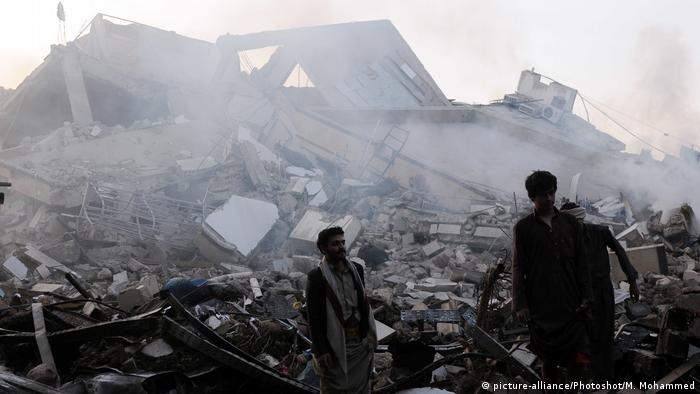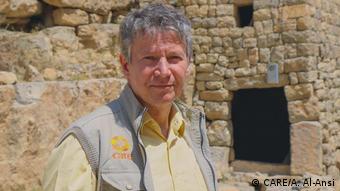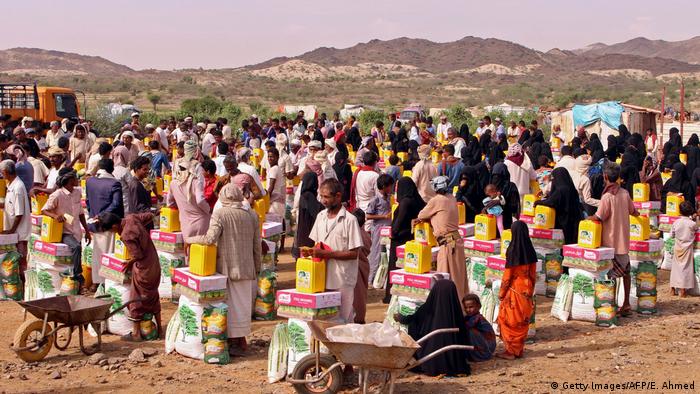Compared with natural disasters, donations for the victims of war are low. In an Interview with DW, Karl-Otto Zentel speaks about the suffering in Yemen, the duty of the Federal government and the peace talks in Stockholm.

Sorry for the last four years: By air raids, houses destroyed in Sanaa
What began four years ago in Yemen as civil war, is now an Intervention and proxy war, especially between the regional powers Saudi Arabia and Iran. Around ten thousand people have been killed. A famine threatened at least half of the 28 million inhabitants. So far, all the peace failed talks between the government and the Houthi rebels. And even before the talks have started today in Stockholm, had covered the war parties, with demands and threats.
Observers have taken a picture of the situation, talk about the greatest humanitarian disaster of the present. One of them is Karl-Otto Zentel, Secretary General of the aid organization Care Germany.
DW: Mr Zentel, what are the prospects of success of the peace talks on Yemen in Stockholm?
Karl-Otto Zentel: for The first Time in 2016 have declared the parties to the conflict to talks. That alone is already a first success. For peace, it always needs a first step, and the had refused to the Parties in the last two years. If these discussions do not lead to a better supply to the people in Yemen, then you were for these people, no success.

Karl-Otto Zentel from CARE Germany
What would in your view be needed to the suffering of the people to mitigate the first?
A ceasefire is for the civilian population a priority. And then, of course, free and unimpeded access for aid in all areas, so that the people who need help most urgently.
What do the people suffer the most?
For a simply of Hunger. Yemen relies for 90 percent of its food on imports. And then, when the main ports are fully accessible and the Unloading of ships is hampered by fighting, just can’t get enough food into the country.
The expulsion from the cities comes: families flee to the countryside, in makeshift accommodation, and are at the mercy of the weather, unprotected. I have seen many children with skin eczema. Due to the barely functioning water supply, Cholera and other diseases by case. By the broken health care system, there is hardly any vaccinations. Polio and diphtheria therefore occur more and more frequently. And what is often forgotten: Many people with chronic diseases such as Diabetes, or diagnoses such as cancer have no chance to Survive: The hospitals are overcrowded and under-supplied, a medical evacuation is not possible, because the airports for civil traffic are closed.
How do you see the role of arms manufacturers such as Rheinmetall, which supply the civil war parties with Material?
We welcomed the stop arms exports to Saudi Arabia explicitly. That, in retrospect, it was announced that he would only be valid for two months, was a disappointment for us. It’s going to be a clear line, and the object of the policy, and not of an individual company. And it remains the case that If there is peace in Yemen, also no more weapons to use, so this must be the ultimate goal.
What needs to be done by the Federal government in such a case?
The Federal government should do, what you agreed in the coalition agreement and what it has committed to: no Export of defense materials to the active parties to the conflict in Yemen. For us the pretty clear words – and the excuses are that any re-licensing would be very carefully examined, contradict these clear words.
Has decoupled from the world community of the conflict and the disaster is not perceived enough?
It is probably more of a Problem of readiness. The United Nations have emphasized with sharp words again and again that Yemen is currently the largest humanitarian disaster in the world. The picture of the starving girl in the New York Times recently went around the world. Today, a current report was published, the notes that 65,000 people in the country suffering so acutely hungry that it meets the criteria of a famine. This incredible 20 million people who are on the verge of coming. One wonders what the international community is waiting for and what still needs to happen so that more pressure is exerted. There is nobody from Yemen to Europe flees, however, most people are looking for in their own country security. This could explain the lack of interest in us, it must be said, perhaps, so clear.

Food output to jeminitische refugees
Does not need to be increased, the pressure on Saudi Arabia and Iran and how such a thing might look like?
It is not a question of individual actors, the situation in Yemen is complex and the longer the conflict lasts, the more the fronts shatter. It applies so quickly and consistently to act. Yemen needs an inclusive and comprehensive peace process that involves all of them, otherwise, a Convention – no matter how difficult to achieve it was not. In order to unite a population after a conflict, you must all sit at the table, starting with the women, who are half the population, and necessarily represented.
Why is the case of natural disasters, the willingness to donate is higher than in the case of conflicts, such as in Yemen?
We see this all the time. For one, natural disasters just in the first few days of a high level of attention in the media. People are entrained by the forces of nature blameless and lose everything. Since the empathy is very high. In Wars, people are asking the question: Who is to blame? And my donation is actually? In the case of complex, intra-state conflicts, Wars and refugee situations aid organisations have to fight again and again about the suffering of the civilian population. And that their humanitarian mandate, care is taken: For we can help regardless of the front history, and affiliations of those in need of survival assistance.
Watch Video 26:38 live Now 26:38 Min. 
In the wrong hands – Yemen and the arms trade
Send Facebook Twitter google+ Tumblr VZ Mr. Wong Xing Newsvine Digg
Permalink https://p.dw.com/p/39QcY

